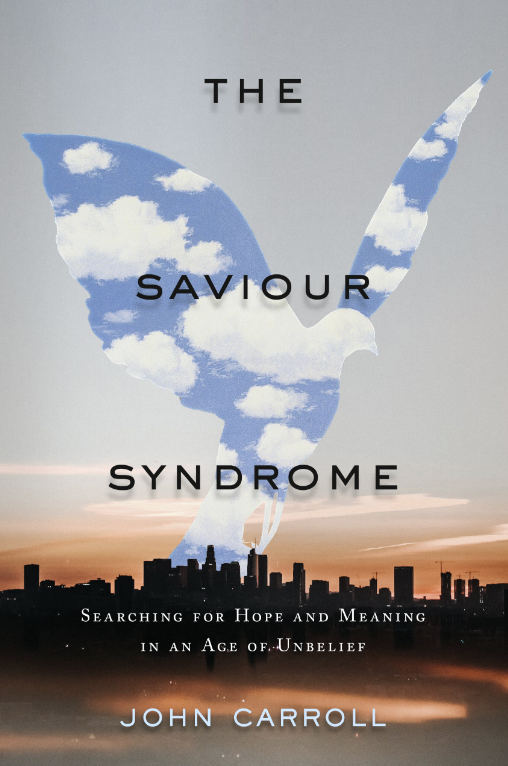Review: The Saviour Syndrome, John Carroll, Sutherland House
In previous books, John Carroll presented as a diagnostician of what lies beneath Western culture, in particular our existential uncertainty, which has been growing since the decline of religious certainty, and how this bubbles up into popular expressions of culture from the works of Shakespeare – particularly Macbeth and Hamlet – to the ‘Westerns’ of movie director John Ford and the plays of Samuel Beckett. His diagnosis involves the turn inward in humanism, dealing with the fear of death by pushing it aside and out of mind, and the narrowing of explanations to the scientific and the economic.

While science is vital for demystifying, it’s main purpose is not to give life meaning, yet we hunger for meaning. When life is unsettling, we look for some purpose beyond the randomness and injustice of the present. Most of us in the West, religious or not, lead mostly secular lives but feel there is something beyond, suggests Carroll. His latest book sees him proposing that in the West we are searching for salvation in a culture where ‘Jesus is assumed to be obsolete’.
This statement gives a sense of the flavour of Carroll’s writing – passionate, penetrating, at times hyperbolic, alert to the modern redirection of an innate religious impulse. So we get sentences like these:
‘Obstetricians worship at the altar of birth.’
‘The modern wedding is about the hope of transfiguration.’
‘Australians worship on the beach.’
He senses a desperation to fill the void at the heart of contemporary society. To paraphrase G K Chesterton, Carroll’s argument is that when you reject Jesus as saviour, you don’t follow no-one, you follow anyone. Carroll finds saviour substitutes in the dream of a glamorous life, the against-the-odds search for a soulmate, the dedicated careers of teaching and medicine, the relief in justice accomplished, and the self – if we, like the Greek philosophers, examine ourselves thoroughly and act authentically.
Carroll finds examples of these saviours in crime TV series, with their satisfying, tied-up ends, in Masterchef’s encouraging mentoring, in over-hyped reality TV series based on finding a life-partner – despite a society with freer sexuality – and in the rituals of football and Anzac Day. He discusses meaningful story ‘arcs’ and says that literature has examples of failed arcs as well. Naturally he turns (and returns) to Shakespeare and Cervantes and Beckett. He finds in fictional crime boss Tony Soprano, who laments the lack of arc in his own story, an existential search worthy of Hamlet. Carroll sees The Great Gatsby as a Jesus-figure – crowds flock to him and drift away when his true character is revealed – in Gatsby’s case, the dream’s curtain is pulled back revealing emptiness, a life built around an illusion.
Late in the book it occurs to Carroll to voice the concern: ‘saved from what?’. This might occur to the reader earlier. As well as a lack of meaning, Carroll writes that we need to be saved from feelings of unworthiness. He sees that, counter-intuitively for our supposedly secular society, guilt is rife, and we want to be judged and found worthy. This may not, of course, be just a legacy of declining faith, but a consistent human trait – the need for justice, meaning, fulfilment, reward.
Of course, if you go looking for alternative saviours, they start popping up everywhere: nationalisms, fashion, comedy, the self-help industry, ‘exotic’ alternative religions, art, the sea-change. In the United States, many evangelical Christians look to Trump as a saviour, despite professing beliefs that are completely antithetical to his character. At a stretch, cosmology is a saviour, saving us from getting too big for our boots, forcing us to face the smallness of our position in the vastness of the cosmos. Carroll sees a similar attraction at the beach – the vast, shifting but (almost) eternal Other, mapping onto our fear of death. Then there is the current search for environmental saviours, from the sensible to the ridiculous – solar and wind power, diamonds shot into the atmosphere to combat warming, escape to Mars, or just simply a (re)connection to the rest of nature, at its most extreme in concepts of wilderness.
One might wonder if some of these things are additions to religion rather than saviour substitutions. A reconnection to the rest of nature may just be simply the shift we need, a substitute for capitalism and technology’s harmful aspects, compatible with recognition and appreciation of a God-given world. A thread of justice runs through the Bible.
Dealing in generalities, Carroll can sound sometimes like the street-corner prophet. One assumes that in the Middle Ages some were dedicated to careers, some just working to pay the bills. Probably some didn’t feel saved. For some TV viewers, Farmer Wants a Wife is just entertainment rather than symptomatic of a search for meaning. And being at the beach may tap into some primordial dread, but it, alternatively, may simply be a soothing experience, akin to sitting in front of an open fire. The void may be real, but maybe not everything points to it. At the same time, the residue of millennia-long religious domination lies across the West, and it’s something that often goes unaccounted for, or is, at least, poorly understood.
Nick Mattiske blogs on books at coburgreviewofbooks.wordpress.com and is the illustrator of Thoughts That Feel So Big.











